Welcome back
Welcome to Cobalt Firearm Instruction’s Gun Shop Dos and Don’ts.
I know what some of you are thinking, and the answer is no. This isn’t going to be another rant by an angry gun-shop employee about all of the insanely unsafe customers they see walking through the door every day.
Those are scary and amusingly cringe-inducing, I’ll admit, but not very actionable. This is a real list of not only what you should avoid doing, but the best practice alternatives of what you should do.
This post (like most of what we’ve talked about so far) is for the new shooter. Someone who has, perhaps, never been to a gun store. Let’s talk about what it’s really like going to your shop for the first time.
A lot of what we will discuss here isn’t just for the first time you walk into a store, these are basic gun store rules and common courtesy to be observed every time you set foot back in the shop.
SO LET’S BEGIN
Have you ever walked into an establishment and felt totally out of place? It feels like you’ve got a large neon sign hanging from your neck that reads “I’m new here, I don’t have a dang clue what I’m talking about and I promise to be a big waste of everyone’s time.”
Might’ve been the first time you walked on to a car lot to buy a car. Maybe the first time you ever went in to get fitted for buying a nice suit. How about walking into a Victorias Secret for the first time (I’m looking at guys and girls with that one.)
Gun shops can be like that, and a lot worse for a new shooter but they don’t have to be. Follow this simple list of “dos” and “don’ts” and you’ll be just fine.
7 STEPS TO GOING TO A GUN SHOP FOR THE FIRST TIME
Step 1. Homework
Step 2. Pick a time for a visit
Step 3. Walking in the door
Step 4. Asking questions/ Listening
Step 5. Handling your first gun
Step 6. Conversation
Step 7. Next Visit

Step 1. Homework
I don’t want to beat this one over the head, but you’ll always do well to do your homework before you hit the shop or the range. We’ve talked at length about this in multiple posts before this, head back and read them if you haven’t.
The key is to learn what you can, but STAY AT THE BASIC LEVEL. Don’t be the guy/girl who walks in and repeats all the stuff they just read on an online gun-forum about stuff way over his/her head.
HOW TO DO IT RIGHT
You’ve read CFI’s blog articles covering firearms basics, the lingo, and safety. You’ve looked through some manufacturers websites and have a good idea of their offerings. You’ve thought about your shooting goals. You’re good, you’ve really educated yourself. The key is to be knowledgeable about the basics; you don’t need to be a rain-man savant the first time you walk in the door.
**Remember to keep your shooting goals in mind throughout, it’s really easy to get distracted.
HOW TO DO IT WRONG
1. Head out without doing your homework. Without any research you’re just walking in blind. You don’t have a clear goal in mind to work towards. You’re asking them to teach you, and to teach you how to understand what they’re teaching you. Shop employees are happy to help a new shooter, but you’re not yet a paying customer, don’t ask for a free 2 hours of their time to just to explain what side of the gun the “bullet-thing” comes out of.
2. Forum Diving. Spending hours of your time pouring through comment threads on forums that you can’t understand, mining for information you’ll try to pass off as your own and sound smart to “fit in”. Don’t do this. You’re only hurting yourself trying to come off as more knowledgeable than you are. Everyone was new at one point in time, own it. Having your goal in mind and admitting that you’re new will get you what you need and more.
Step 2. Pick a time for your visit.
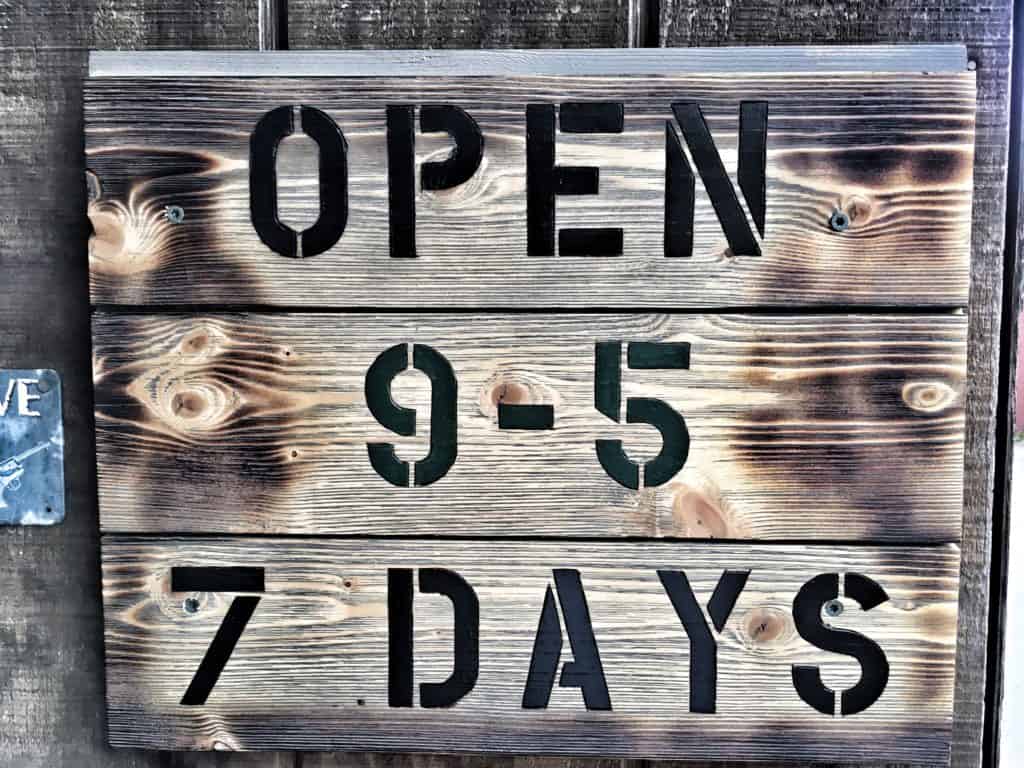
Many gun shops keep odd hours, make sure they’re open when you plan to go for the first time. Check their website or call and ask about hours before you go.
HOW TO DO IT RIGHT
1. Go during a “slow time”. You don’t want to waltz into the shop on their peak weekend hours asking for hands on assistance in learning guns from the ground up. You’re going to have a lot of questions and it’s going to take some time to address them. Be considerate of the employees and shop owners. Nice as they may be, they’re still running a business and it’s a tall order when they have a line of paying customers out the door to take you by the hand for a couple hours and explain guns to you out of the goodness of their hearts. Look up the shop online (as I’m sure you’ve done if you’ve read our previous posts.) Many even have their busy hours posted on google like in the picture below.
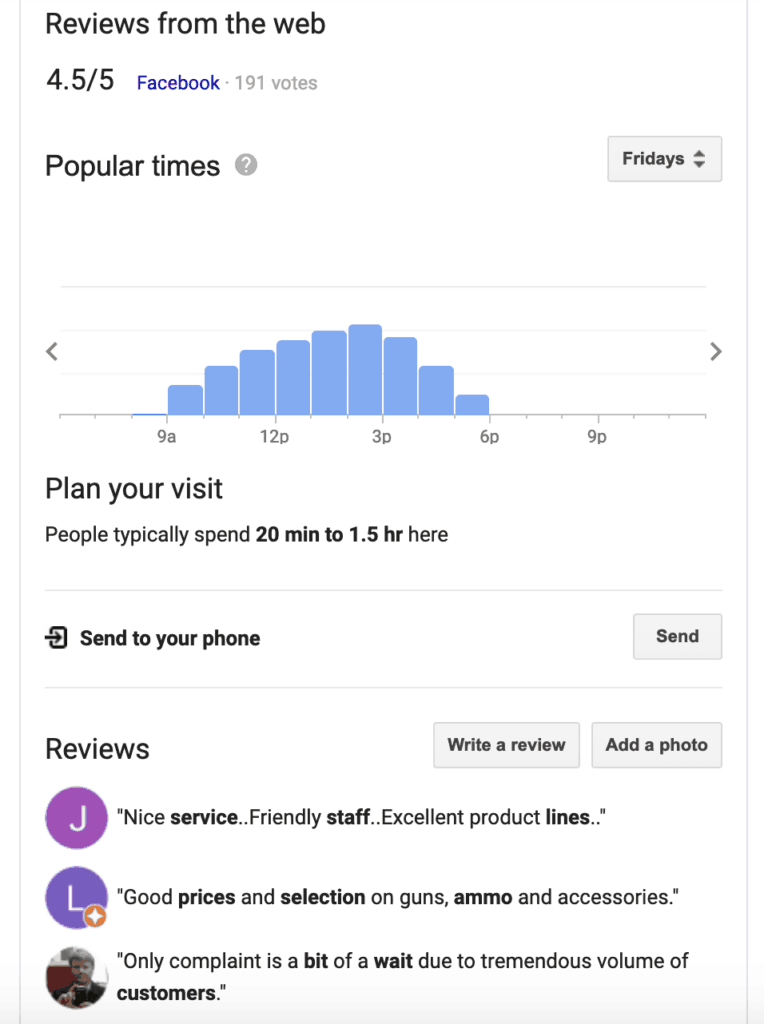
A good rule of thumb is that weekdays between opening and 11:30am, and between 2pm and 5pm will be your best bets for a slow time (if there is one at all) in most shops.
HOW TO DO IT WRONG
1. Bring 4 close friends who don’t know anything about firearms along with all the kids out to the gun store in the middle of a gorgeous Saturday to ask everyone in the shop to teach you about guns.
You’d be surprised, this is not uncommon. And, yes I can understand, it’s a day that people have free and it’s always less intimidating when you have your crew along with you. However, as it will be the busiest possible time for the gun shop, you may not get the attention that you want, and you’ll probably get the shorthand version of the information that you need (as they try to move quickly through the long line of customers.)
Step 3. Walking in
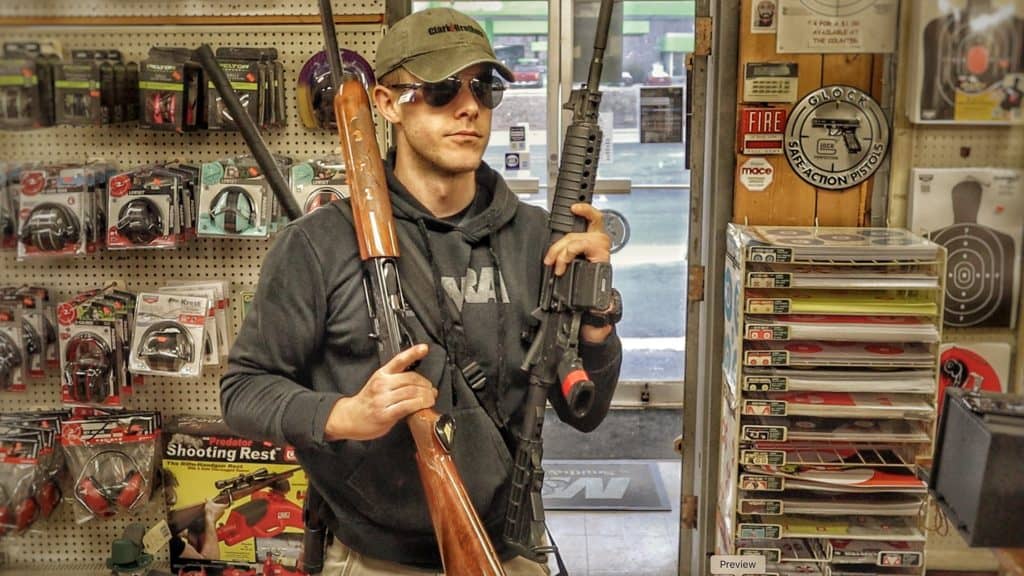
HOW TO DO IT RIGHT
1. Be calm
2. Be polite
3. Introduce yourself
4. OWN THE IGNORANCE
Example: “Hey *shake hand* name’s Keith. Figured you all might not be too packed right now. I’m gonna be honest I’m completely new to all this, do you have a second? I’m getting into shooting, I want to get my concealed carry permit but I’m still at square one here.”
That’s it, it’s that simple. Any employee worth anything will jump on that opportunity to take over from there. In one sentence you’ve shown respect for their time, forethought, purpose, and a willingness to learn and defer to their expertise. Spot on.
HOW TO DO IT WRONG
1. Walk in super nervous – The employees are (typically) armed and standing guard over thousands and thousands of dollars of firearms and ammunition, if you walk in looking nervous and furitive, it’s going to make antennas go up quick.
2. Walk in with your head down like you’re avoiding a car salesman – Same explanation, they might think you’re just trying to steal things rather than rob them by force, but the end result will be the same.
3. Pretend to be an expert. See above explanations.
4. Make a joke about anything that sounds even REMOTELY ILLEGAL – I have no idea where this comes from, but for some reason (be it nerves, or awkwardness) some people seem to think that a gun shop is a funny place to crack a joke about committing crimes with a firearm as a way to break the ice. NO. You’ve just branded yourself as someone to be watched with a wary eye. No one knows you and no one knows if you’re joking.
Let’s look at some examples of how to do it wrong:
“Hey, no I’m fine just browsing.” – We all want to go into default mode of “no, leave me alone, I don’t want to be sold to.” Resist the urge, they’re there to help. You don’t know yet exactly what it is you’re browsing for, and you don’t know what it is that you don’t know. No one’s holding a gun to your head and making you buy anything, ask for assistance.
Or
“‘Sup, I’m looking for an MOS Glock, wanna make sure it’s got a picatinny rail to mount my tac light. I want some night sights but something tall, I’m looking for co-witness when I slap an RMR on there, got something like that?”
Even if you’ve managed to learn what all that means through some gun forum you were reading, you’ve just told everyone in the shop that you know what you want and what you’re talking about (to an extent.) You’re new, take advantage of their knowledge and let them walk you through what they’ve got.
I guarantee they know true experts in the field. You’re not winning points by pretending you know something about guns, they won’t be impressed and you’re short changing yourself.
Or
“Hey, Im new to guns, I’m just looking for something cheap.” NO NO NO NO NO. I get it, this stuff ain’t cheap. This is not an inexpensive sport / type of training and money doesn’t grow on trees. Two quick points here:
1. “Cheap” shouldn’t be your goal when looking for your first firearm. Having a price point in mind? Absolutely. That’s called good planning, but don’t ask for cheap. We’ll be covering Buying Your First Handgun in detail in an upcoming post. Suffice it to say, your first firearm shouldn’t be where you look to skimp.
2. You’ve just lost the interest of the guy behind the counter. Sure, you’ve achieved the goal of keeping them from wasting your time showing you the fancy $2,000 handguns, but to them, you’re just someone who doesn’t understand the serious nature of this business. You’re trying to save a quick buck, and you will inevitably come back and complain that it doesn’t work like you saw it in the movies. If price is a serious concern, I understand. As you talk, tell them about what your goals are and what your price point is (I’m sorry, but it shouldn’t be “I’m trying to keep this under $200 out the door”.) A reliable firearm doesn’t have to cost an arm and a leg, but above all, you always want quality.
Step 4. Asking questions/ Learning
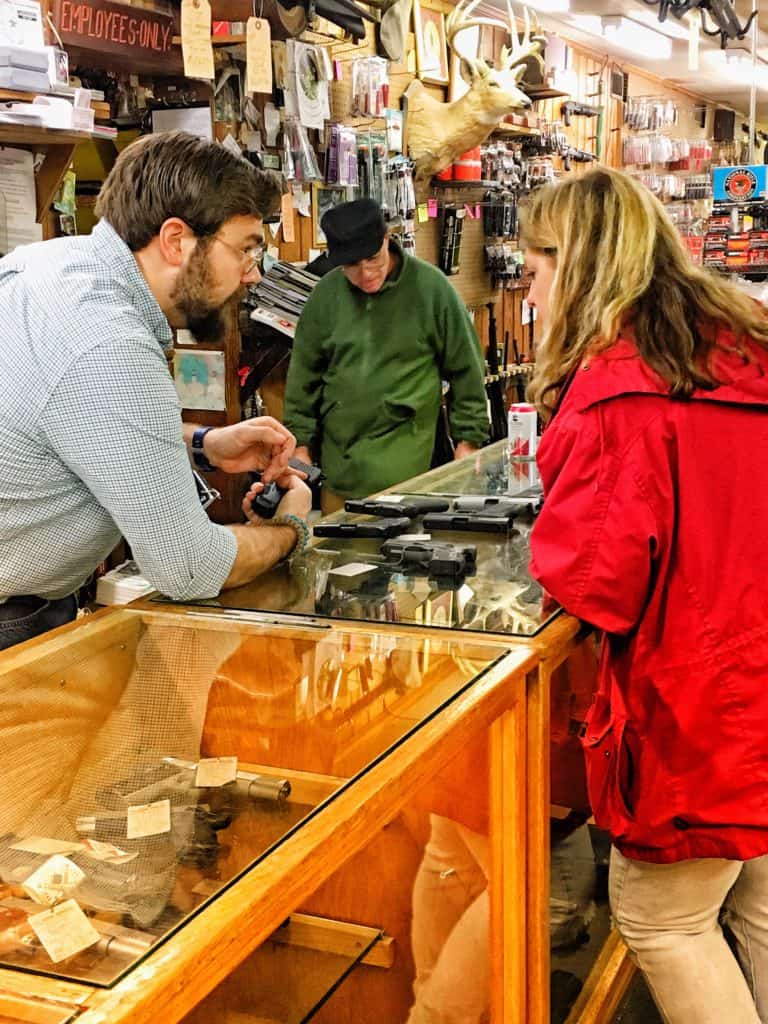
You’re going to have a lot of questions after you get the ball rolling with the clerk. Once you’ve told them you’re new and let them know your goals, sit back and listen for a bit. Let them run with it for a second before you jump in with a million questions. You’ll learn some good stuff by just listening at first.
HOW TO DO IT RIGHT
1. LISTEN WELL
2. Stay on topic – You’ll have time to get to all of your questions. I know you’re excited to learn!
Don’t jump from ammunition, to handguns, to self-defense law, to hunting, and over to holsters all in one thought. You’re going to miss a ton of good information!
3. Avoid starting with self-defense! It is a valid set of questions and you can get to it in due-time. You’ll immediately put people’s guards up if your first question your first time in a gun shop is about the legal ramifications of shooting someone, even if you’re talking about legal self-defense.
4. Answer honestly. Don’t lie about knowing what you don’t and definitely don’t lie about experience you don’t have. First off, 9 times out of 10 the employees can smell the “B.S” right off the bat. Secondly, you’re keeping yourself from learning what you need to know because you think it’s getting you some kind of respect.
5. Stay grounded in real-world issues. Not much makes a gun shop employee roll their eyes and write you off faster than asking about “what round would kill a zombie the best?”
6. Ask pointed, yet open ended questions – Example: “I’m still a little fuzzy on the difference between striker fire and hammer fired handguns. What are your thoughts on pistols that I’ll just be keeping in the house for protection?” – Excellent! You’ve shown that you’ve done some homework and you’ve got a well thought-out question that needs answering, but you’ve left it open for them to take the answer and run with it, helping you learn what YOU DIDN’T EVEN KNOW YOU DIDN’T KNOW.”
HOW TO DO IT WRONG
1. Gun grabbing right away. Skipping the Q&A altogether and getting your hands on some steel.
2. Talking over the clerk. Rude.
3. Starting EVERY QUESTION with “I know…” or “I read…” or “I saw on…” We appreciate that you did some homework and we hope you’re getting information from good sources (like cobalt firearm instruction’s New Shooter Blog) but if you phrase every question as a chance to show off the knowledge you got from watching NRA TV, clerks may find it annoying quick.
4. Assuming you know the shop better than them. If you are new, you shouldn’t be starting questions with phrases like “I know you don’t do _________” or “I know you don’t have _________” unless you’ve already asked them and know for certain. It can come off very obnoxious to people who are proud to know their business inside and out to have you telling them what they do and don’t do.
5. Joking about crimes. Seriously, this is a huge NO. If the clerk tells you about the double stacked magazine, DO NOT reply with “cool, might have to cook off a lot of rounds at the heist later.” It is not funny, you’re not earning points, you’re putting people on edge.
Step 5. Handling your first gun.
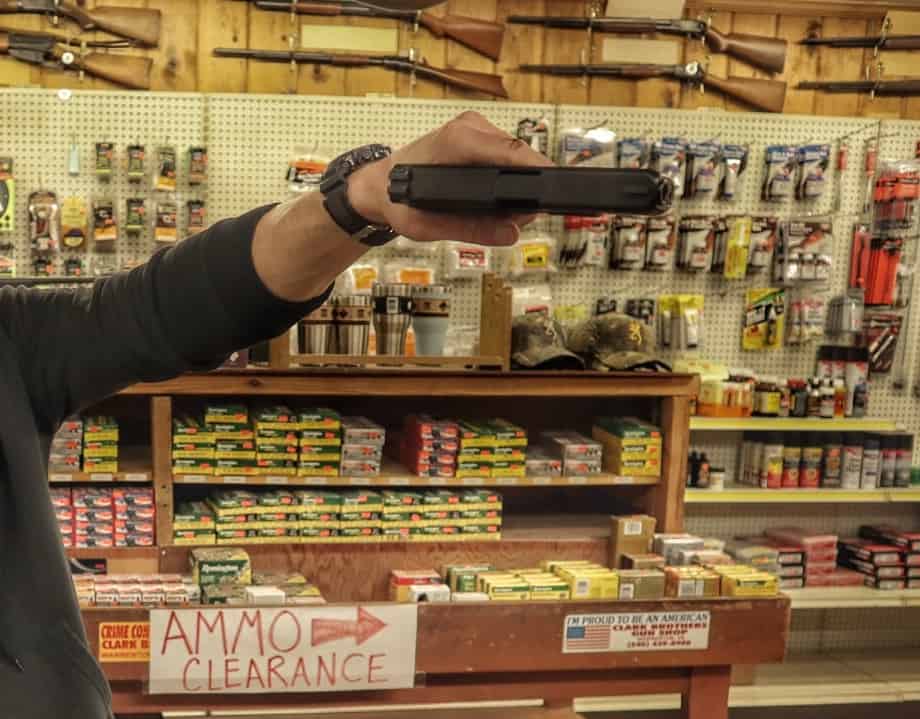
The moment of truth. Getting your hands on a gun. Try your best to only have 1 or 2 out on the table at a time and make sure you NEVER point them at ANYONE.
HOW TO DO IT RIGHT
1. OBEY ALL FIREARM SAFETY RULES. Treat it like it is loaded, do not point it at anyone.
2. Check every gun you touch to ensure it’s not loaded. Yes, even the one the clerk just handed you. They will not be offended (if they are, they aren’t the clerk you want to work with) they will be pleased with your sense of firearm safety, trust me.
3. Treat the gun with respect. That gun represents 100s of dollars to the shop owner, handle it properly, set it down gently, don’t toss it down on the table or smack it around. I know guns are built rugged, but have respect. You wouldn’t like it if I asked to borrow your phone and then tossed it on your granite counter top when I was done using it would you?
4. Ask before dry firing. Dry firing is a critical part of both testing and training with most firearms, it’s not ridiculous that you should want to do so, but ALWAYS ASK BEFOREHAND. There are some guns (such as rimfire .22 pistols, etc.) that could be damaged by the act, and some shops don’t want you to dry fire period.
5. POINT THE GUN IN A SAFE DIRECTION (yes this is a repeat and it deserves repeating.)
HOW TO DO IT WRONG
1. Asking to see all the guns at once. It’s easy to get overwhelmed and lose track of what you’re talking about with all those pretty looking guns on the table.
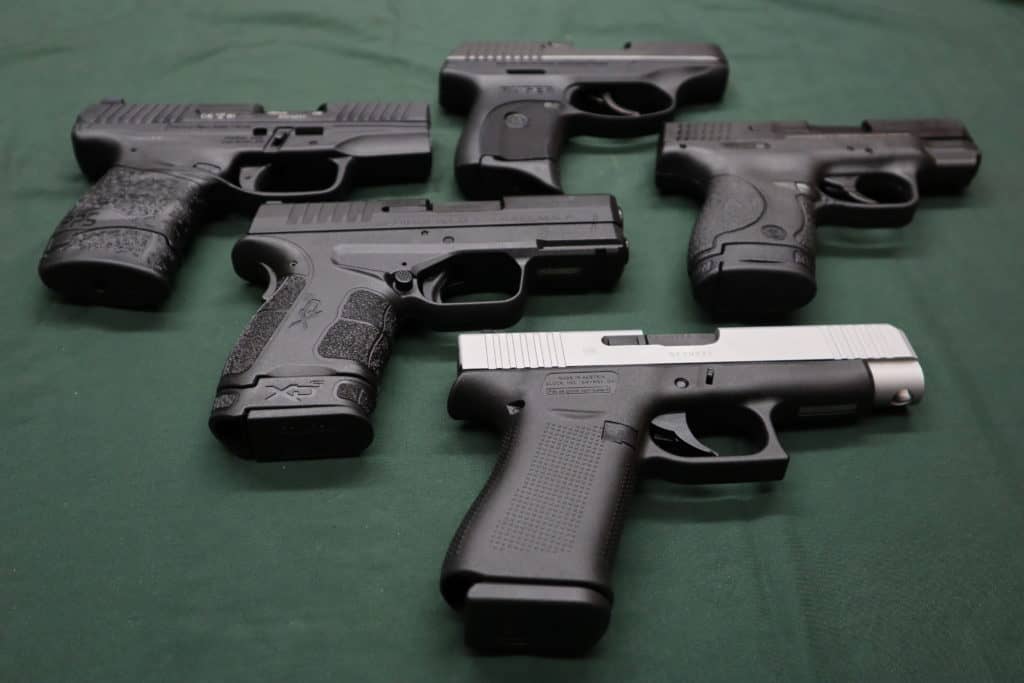
2. Grabbing the gun out of the clerk’s hands. Especially if it’s before they’ve cleared it fully. NO. Let them hand it to you.
3. Holding the gun sideways. While not inherently unsafe, this is a STRONG indicator to anyone watching that you are not to be trusted to safely handle firearms, you’re not taking this seriously, and you’ve seen far too many movies.
4. Holding the gun below the counter where the clerk cannot see it. Every good employee in a gun shop will have absolutely none of this. I don’t care if you’re a member of my family, I need to see what you’re doing with that firearm at all times. I know you’re probably doing something harmless, but the employees do not know that and they are not going to chance a fatal incident, KEEP IT VISIBLE.
5. Approaching another customer with the gun in your hand. “Hey man you’ve got to check this out.” Don’t count on the fact that they have been watching you this whole time. All they’re guaranteed to know is someone just approached them from their blind spot holding a gun. There’s a decent chance this person is currently armed. Don’t do it.
6. Being too excited/nervous. This one’s serious. You will instantly see jaws set and eyes narrow from anyone paying attention when someone has too much jittery nervous energy and a gun in their hand. Take a breath if you’re a nervous type and be calm, I know it’s exciting and possibly scary to hold a gun, you’ve checked that it’s empty, so has the clerk, it’s safe as long as you are, so just relax.
Step 6. Further Conversation
You’ve checked out the guns, maybe you’re not ready to hit the range but you’re still there talking and picking up what you can. Here are some rules to make sure you’re still following. They fall into a miscellaneous category but they’re always good to keep in mind.
HOW TO DO IT RIGHT
1. Keep the politics to a minimum, at least to start. I know it can be tempting nowadays to look at gun shops as a haven where you’re surrounded by like-minded people who won’t be triggered by every little thing that you say. This is the case for the most part, and I’ve taken part in many spirited and thoughtful political debates at the gun counter. That being said, especially on your first time there, you’re there to learn. You can complain about your senator any time you like, keep it about the business at hand. It’s easy to start talking politics and get everyone off on a tangent.
2. Keep your “prepping” plans to yourself. You don’t want people immediately looking at you as a new shooter who’s here to stock his bomb shelter and learn how to kill humans. This tip runs in the same vein as not asking about lethal force laws right off the bat. **Side note here, if you’re actually prepping, you don’t want to let other people know about your preparations, just saying.
3. Don’t try and buy a gun being sold to the shop. This is bad form. Period. Don’t interrupt a transaction and try and undercut the shop no matter how much you like the gun. You’re angering the people who run the shop that you will most likely come back to numerous times in the future for the sake of one deal on one gun, let it go and buy it from the shop if you want it so bad.
4. Ask before moving or opening anything. A lot of things need to be checked or tested when it comes to firearms. Make sure you don’t assume and just start rummaging through things and taking them apart, especially boxes of ammunition.
HOW TO DO IT WRONG
1. Butting in to other conversations. Even if you have the best intentions, try and avoid it. Gun shops are full of people with good intentions, bad information, and a NEED to share it with people, be better than that.
**Exception to this rule** If you ever hear advice or information being given in a gun shop that would lead to UNSAFE or ILLEGAL ACTIONS, step right in and correct it. You’ve got my blessing and the blessing of anyone around who knows what they’re talking about.
2. Touching someone else’s gun without asking. There may be firearms lying on the table as you’re talking with the employees. If they aren’t one that you’re currently looking at, they belong to someone else or someone else is looking at them, DO NOT TOUCH. This goes a million times over for a gun in someones holster on their person, NEVER TOUCH.
3. Asking about what the price would be online/ saying it’s cheaper elsewhere. So you want to come into my shop and test all my firearms, spend hours with my employees learning all we have to offer, use my range facilities, and then not only take your business elsewhere but announce to other customers that you know a place online to find it $40 cheaper… Really?
4. Leaving kids unattended. I would advise against bringing kids on your first outing to the gun shop period. It’s a gun shop. With real guns and live ammunition, probably knives and other dangerous items. If you are engrossed in learning about your gun, who is watching the kids? Need I say more?
5. Answering the phone and staying at the counter for the call. This one is just common courtesy, but one I see ignored all the time at gun shops, more so than other places, just don’t do it.
Step 7. Next Visit
This last one is not gospel, it’s just my opinion based on my experiences. If you’ve followed the steps I’ve listed so far, you will have made one hell of a good first impression at your gun shop. You’ll have gotten a lot of information about guns, shooting, your own goals, and more. Why not give them a heads up about when you’ll be back in again? This step isn’t crucial but I know it works. Shake their hand, tell them when you’re planning on coming back and what you’ll be doing.
Example: “This was great, you’ve been a tremendous help I appreciate all the time. I’m gonna get home, I’ll be back through next week around the same time to check out the range and maybe pull the trigger on buying that Glock.”
I’d be willing to bet (especially if you’re talking about a mom and pop gun shop) that the next time you walk into that store they will remember your name, what you talked about, and possibly have that Glock ready for you to look at and maybe even test on the range (if they have one.)
Conclusion
Going to the gun shop doesn’t have to be scary, make you nervous, or be anything less than a great way to spend the day for you.
New or seasoned, refer back to this list and make sure you’re always following best practices at your local gun shop!
Send me a message and tell me about your first gun shop experience. While you’re at it, send Cobalt Firearm Instruction ALL of your questions about gun shops and gun ranges, we’re happy to help.
Stay Smart, Stay Safe, Never Stop Improving.

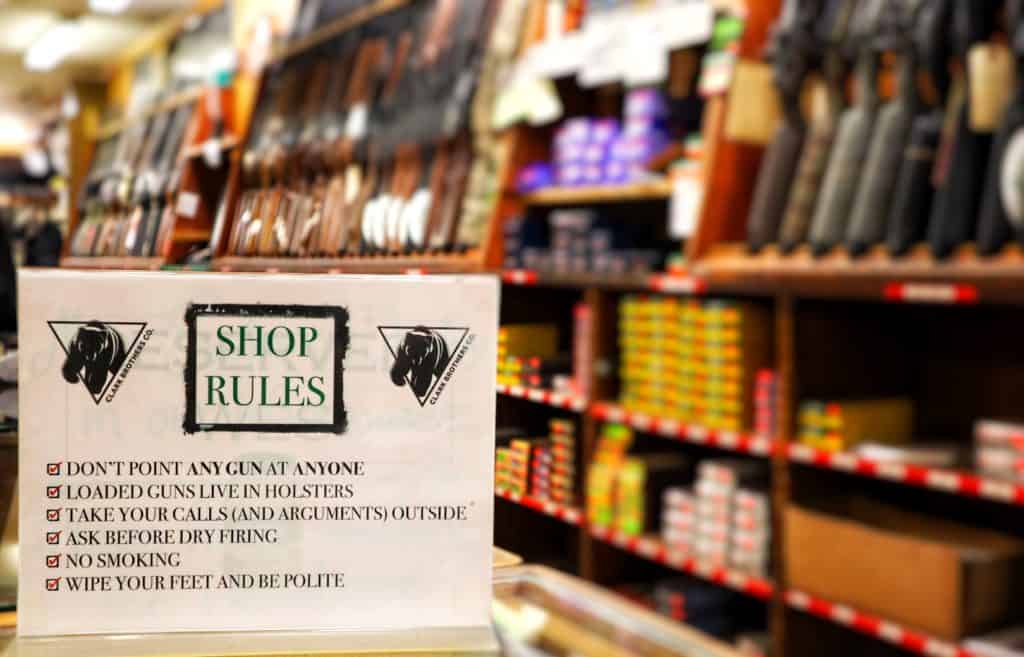
Pingback: Try a Gun Before You Buy » Cobalt Firearm Instruction